新概念英语第一册练习Lesson125-132情态动词
新概念英语第一册L125~126

Lesson 125 ~ 126 Tea for two◆ 词汇详解(1) water v. 浇水猜猜看:waterfall 瀑布e.g. Can you water my garden while I’m away?你能在我离开的时候替我的花园浇水吗?(2) terribly adv. 非常e.g. The man felt/was terribly sorry for his lateness/being late.那个人对于迟到感到非常抱歉。
(3) dry adj. 干燥的,干的e.g. The weather was hot and dry. 天气又干又热。
常用搭配:dry season 旱季(4) nuisance n. 讨厌的东西或人e.g. What a nuisance!(课文原句)常见结构还有:What a pity/shame!真可惜/真遗憾!(5) mean v. 意味着,意思是(mean - meant - meant)e.g. The red light means ‘stop’. 红灯意味着停止。
(6) surprise n. 惊奇,意外的事e.g. I’ve got a surprise for you. 我有个惊喜要送给你。
(7) immediately adv. 立即地e.g. The telephone rang, and he answered it immediately.电话铃响了,他立刻去接了。
同义扩展:immediately = right now = at once◆ 课文解析之经典例句(1) I must water the garden first.!情态动词must表示“必须”,“一定要”,可用于肯定句和疑问句;用于否定句时,mustn’t的意思是“一定不要”,“不许”,而不是“不必”。
e.g. You must finish it today. 你一定要在今天完成它。
新概念英语第一册Lesson125-126笔记(语法点+配套练习+答案)
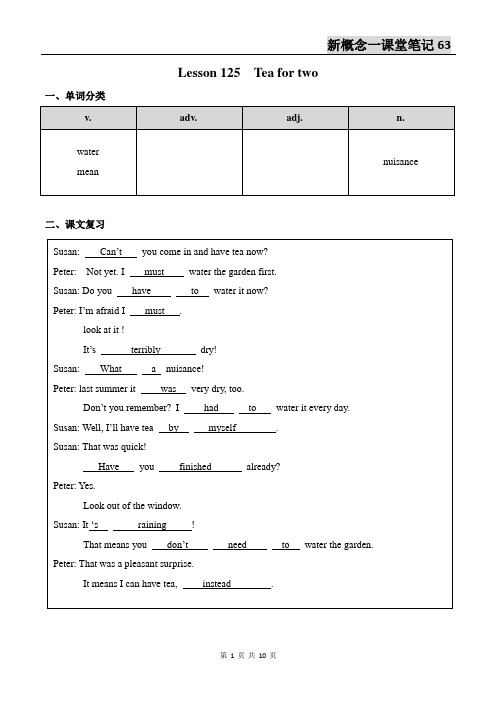
I'mterriblysorry.我非常抱歉。
I’ve got aterribletoothache.我得了要命的牙疼。
dry
1.adj.干燥的
反义词:wet
2.v.使...变干
It is alwaysdryinfall.秋天天气干燥。
2. ____ bright girlsthey are!
A. WhatB. What a C. How D. How a
3. ____ interestingthe film is!
A. What B. What anC. HowD. How a
4. ____ sunny day! Let’s go out for a walk.
这个单词是什么意思?
The red lightmeans stop.红灯意味着停止。
Imean to traveltomorrow.
我打算明天去旅行。
surprise 1. n.意外的事,吃惊
to one’s surprise令某人吃惊的是
2.v.令人吃惊
surprising adj.令人吃惊的(物)
surprised adj.感到吃惊的(人)
be surprised at sth.对…感到惊讶
To my surprise, she is the mother of two children.
令我惊讶的是,她竟然是两个孩子的妈妈。
Youalways surpriseme.你经常让我惊喜。
This is such asurprisingthing.
我爷爷正在花园里浇花。
一杯水a glass of water
新概念英语第一册Lesson127_132语法及单词解析

新概念英语第一册Lesson127~132语法及单词解析新概念英语第一册Lesson127~128语法及单词解析语法 Grammar in use表示猜测和推断的情态助动词must和can't表示最有力的推论的最常用的形式是must和can't。
这时,它们一般与系动词be连用。
肯定的推断用must be来表示,否定的推断用can't be来表示,而不用mustn't。
请看例句:He can't be a doctor. He must be a dentist.他不会是个医生。
他一定是位牙医。
She can't be Danish. She must be Norwegian.她不会是丹麦人。
她一定是挪威人。
He can't be shaving. He must be having a bath.他不可能在剃胡子。
他一定是在洗澡。
It can't be cheap. It must be expensive.它不会便宜。
一定价格昂贵。
He can't be ill. He must be tired.他不可能生病了。
他肯定是累了。
词汇学习 Word study1.famous adj.(1)的;出名的:She's a very famous actress.她是一位非常的女演员。
(2)<口>第一流的;极好的:To my surprise, he had a famous appetite.让我感到惊讶的是,他有着极好的胃口。
This is famous weather for a stroll.这是散步最理想的天气。
2.at least(1)至少:This antique vase is worth at least £20,000.这只古花瓶至少价值两万英镑。
At least, you should consider our suggestions.至少你应该考虑一下我们的建议。
新概念英语第一册第125-126课重点语法

新概念英语第一册第125-126课重点语法一、第125-126课的重要句型或语法内容1、情态动词本课侧重的是情态动词must和need的用法,同时对比了have to的用法。
其中,需要注意的是must与have to的区别以及must的否定表达。
如:1)Do you have to water it now? I'm afraid I must.问句采用have to,强调的是客观上是否不得不,而回答时采用must,强调是自己主观认为必须。
2)That means you don't need to water the garden.句中的don't need to用作must的否定表达。
二、课文主要语言点Can't you come in and have tea now, Peter?Not yet. I must water the garden first.1)Can't you...?,反问句,往往用来提出建议或质疑。
2)not yet,还没有、还没好 3)water the garden,给花园浇水。
water在此用作动词,表示浇水的意思,如water the flowers,浇花。
Do you have to water it now? I'm afraid I must. 注意have to与must的区别:have to强调是出于客观原因“不得不”做某事,而must则偏重的是主观上认为“必须”。
另外,have to不是情态动词,就是一般的动词短语,之所以会放到情态动词里一起讲解,仅仅因为它能够表“必须”。
Look at it! It's terribly dry. terribly是terrible(可怕的)的副词,但在此处相当于very,表示非常、很。
What a nuisance! 1)nuisance,讨厌的东西或人。
新概念英语第一册练习册答案
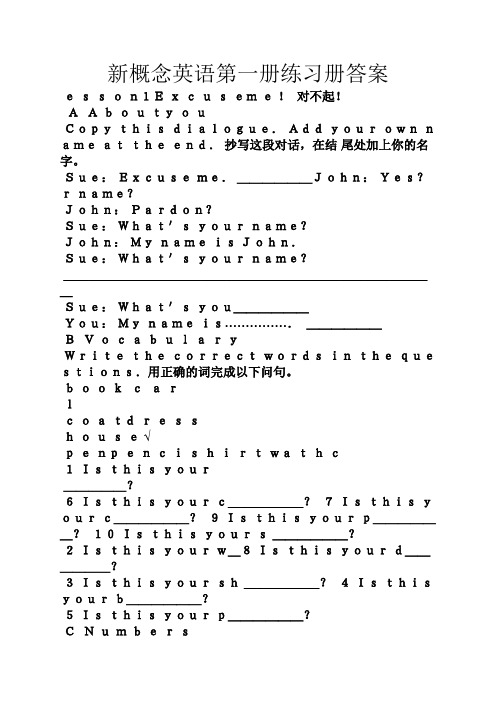
新概念英语第一册练习册答案esson1Excuseme!对不起!AAboutyouCopythisdialogue.Addyourownnameattheend.抄写这段对话,在结尾处加上你的名字。
Sue:Excuseme.______John:Yes?rname?John:Pardon?Sue:What'syourname?John:MynameisJohn.Sue:What'syourname?______________________________Sue:What'syou______You:Mynameis…………….______BVocabularyWritethecorrectwordsinthequestions.用正确的词完成以下问句。
bookcarlcoatdresshouse√penpencishirtwathc1Isthisyour_____?6Isthisyourc______?7Isthisyourc______?9Isthisyourp______?10Isthisyours______?2Isthisyourw_8Isthisyourd______?3Isthisyoursh______?4Isthisyourb______?5Isthisyourp______?CNumbersWritethenumbersinfigures.用阿拉伯数字表示以下数词。
three3four______eight___________nine______seven____two______ten______one______six______five______Lesson2Isthisyour…?这是你的…吗?AStructureWritequestionswiththewords.用所给的词写出问句。
HandbagIsthisyourhandbag?1bo______ok______2ca______r3coat4dress______5house______6pen______7pencil______8shirt______9skirt______10watch______BSituationsLookatthesituations.Whichexpressiondoouuseforeach?针对所给情景选择你应该说的话。
新概念英语第一册Lesson125_130重点句型及语法
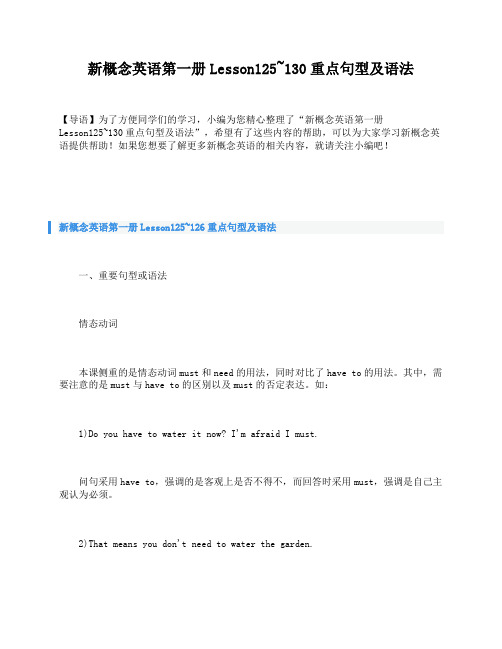
新概念英语第一册Lesson125~130重点句型及语法【导语】为了方便同学们的学习,小编为您精心整理了“新概念英语第一册Lesson125~130重点句型及语法”,希望有了这些内容的帮助,可以为大家学习新概念英语提供帮助!如果您想要了解更多新概念英语的相关内容,就请关注小编吧!新概念英语第一册Lesson125~126重点句型及语法一、重要句型或语法情态动词本课侧重的是情态动词must和need的用法,同时对比了have to的用法。
其中,需要注意的是must与have to的区别以及must的否定表达。
如:1)Do you have to water it now? I'm afraid I must.问句采用have to,强调的是客观上是否不得不,而回答时采用must,强调是自己主观认为必须。
2)That means you don't need to water the garden.句中的don't need to用作must的否定表达。
二、课文主要语言点Can't you come in and have tea now, Peter?Not yet. I must water the garden first.1)Can't you... 反问句,往往用来提出建议或质疑。
2)not yet,还没有、还没好3)water the garden,给花园浇水。
water在此用作动词,表示浇水的意思,如waterthe flowers,浇花。
Do you have to water it now? I'm afraid I must. 注意have to与must的区别:have to强调是出于客观原因“不得不”做某事,而must则偏重的是主观上认为“必须”。
另外,have to不是情态动词,就是一般的动词短语,之所以会放到情态动词里一起讲解,只是因为它可以表“必须”。
新概念英语第一册第125课Lesson125课文单词知识点
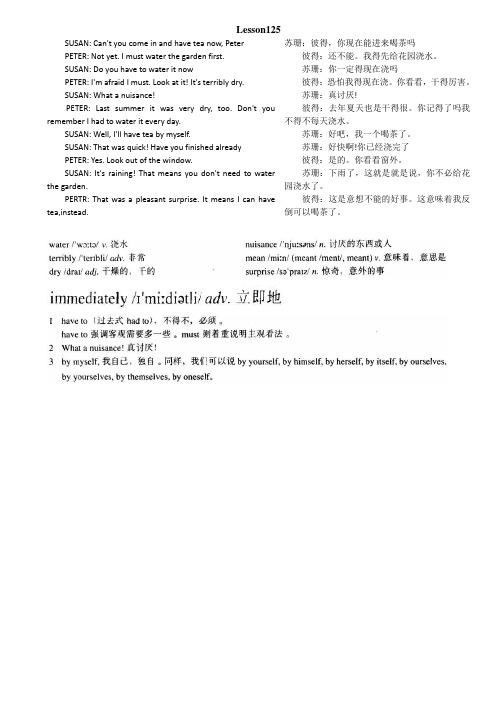
Lesson125SUSAN: Can't you come in and have tea now, PeterPETER: Not yet. I must water the garden first.SUSAN: Do you have to water it nowPETER: I'm afraid I must. Look at it! It's terribly dry.SUSAN: What a nuisance!PETER: Last summer it was very dry, too. Don't youremember I had to water it every day.SUSAN: Well, I'll have tea by myself.SUSAN: That was quick! Have you finished alreadyPETER: Yes. Look out of the window.SUSAN: It's raining! That means you don't need to waterthe garden.PERTR: That was a pleasant surprise. It means I can havetea,instead.苏珊:彼得,你现在能进来喝茶吗彼得:还不能。
我得先给花园浇水。
苏珊:你一定得现在浇吗彼得:恐怕我得现在浇。
你看看,干得厉害。
苏珊:真讨厌!彼得:去年夏天也是干得很。
你记得了吗我不得不每天浇水。
苏珊:好吧,我一个喝茶了。
苏珊:好快啊!你已经浇完了彼得:是的。
你看看窗外。
苏珊:下雨了,这就是就是说,你不必给花园浇水了。
彼得:这是意想不能的好事。
这意味着我反倒可以喝茶了。
【知识点讲解】(一)单词扩展1. water v. 浇水I went out to water my roses.我出去给我的玫瑰浇水。
新概念英语第一册课文翻译及学习笔记Lesson125

新概念英语第一册课文翻译及学习笔记Lesson125【课文】SUSAN: Can't you come in and have tea now, Peter?PETER: Not yet. I must water the garden first.SUSAN: Do you have to water it now?PETER: I'm afraid I must. Look at it! It's terribly dry.SUSAN: What a nuisance!PETER: Last summer it was very dry, too. Don't you remember? I had to water it every day.SUSAN: Well, I'll have tea by myself.SUSAN: That was quick! Have you finished already?PETER: Yes. Look out of the window.SUSAN: It's raining! That means you don't need to water the garden.PERTR: That was a pleasant surprise. It means I can have tea,instead.【课文翻译】苏珊:彼得,你现在能进来喝茶吗?彼得:还不能。
我得先给花园浇水。
苏珊:你一定得现在浇吗?彼得:恐怕我得现在浇。
你看看,干得厉害。
苏珊:真讨厌!彼得:去年夏天也是干得很。
你记得了吗?我不得不每天浇水。
苏珊:好吧,我一个喝茶了。
苏珊:好快啊!你已经浇完了?彼得:是的。
你看看窗外。
苏珊:下雨了,这就是就是说,你不必给花园浇水了。
彼得:这是意想不能的好事。
这意味着我反倒能够喝茶了。
【生词】water v. 浇水terribly adv. 非常dry adj. 干燥的,干的nuisance n. 讨厌的东西或人mean (meant, meant) v. 意味着,意思是surprise n. 惊奇,意外的事二【知识点讲解】(一)单词扩展1. water v. 浇水 I went out to water my roses.我出去给我的玫瑰浇水。
新概念英语第一册第125课Lesson125课文单词知识点

Lesson125SUSAN: Can't you come in and have tea now, Peter PETER: Not yet. I must water the garde n first. SUSAN: Do you have to water it nowPETER: I'm afraid I must. Look at it! It's terribly dry. SUSAN: What a nuisa nee!PETER: Last summer it was very dry, too. Don't you rememberI had to water it every day.SUSAN: Well, I'll have tea by myself.SUSAN: That was quick! Have you fini shed already PETER: Yes. Look out of the win dow.SUSAN: It's raining! That means you don't need to water the garde n. PERTR:That was a pleasant surprise. It means I can have tea,instead.water/'wxu/ v rnuisance /'njuis^ns/ 讨燉的乳西或人terribly / lenbii/ adv.出常 medn (meant /nient/> meant)卩恿味私 意思是<ir )/draT/ adj,干燥的,F 的* surprise'sa'praiz/H, IS 奇’意外帕事immediately讥 立即地1 have to (过去式had to) >不得不,必绩匸have to ®调專观需要多~些° 则着痕说明主观#法°2 Whai a nuisance^ 貞讨厌!3 by myself,找自已 $ 魏自* 同样,我(f 「可以说 by yourself, by himself, by herself* by itself* by ourselves,by yourselves, by themselves, by oneself,苏珊:彼得,你现在能进来喝茶吗彼得:还不能。
最新新概念英语第一册练习Lesson125-132情态动词

Lesson125-132 must及其它情态动词的用法一、单词1.Susan does not want to have dance class on Sunday, but she ______.(have to ) 2. --_____she leave early?--No, she ______.(must )3. I am afraid I won’t catch the bus. I _____take a taxi. (have to )4. Today is Sunday. We ______get up so early. (need to )5. I _____ tired, because I fell asleep while I was having a class.(must be )6. Lucy didn’t feel well. She______ a bad cold. (must have )7.It ______ Mr.Wu. It is said that he has gone to America.(can be )8. Look,Tom is ______ to you .(wave)9. You _______do it quickly---the teacher is leaving.(had better)二、单项选择( )1. I don’t think he _____a new bike .A need to buyB needs to buyC needD need buy( )2.We _____ talk loudly when we see the “Be Quiet” sign.A mustB mustn’tC needD needn’t( )3. ---I can tell you the secret if you want to know.---You_____. I’m not asking you.A mustn’tB may notC can’tD needn’t( )4. Yesterday it rained heavily. We _____stay in our classroom.A shouldB mustC had toD shouldn’t( )5. ---____I put the books here?---Sorry, you can’t. You have to take them home.A NeedB MustC MayD Should( )6.You have already tried your best, so you _____worry about it .A can’tB needn’tC mustn’tD couldn’t( )7.There are______40 students in his class.A much thanB more thanC much moreD no than( )8.Don’t go there alone(独自) . You ____get lost(迷路).A needB mustC mayD should( )9. There is no light on—they _____be at home.A can’tB mustn’tC needn’tD shouldn’t( )10.Tom has ten big houses in London, so he ____ be very rich.a. mayb. mustc. cand. might( )11. — Tom is never late for work. why is he late today?— Something ____ to him.a. must happenb. should have happenedc . could have happened d. must have happened( )12. — I heard they went skiing in the mountains last winter.— it ___ true because there was little snow there.a. may not beb. won’t bec. can’t bed. mustn’t be( )13.Johnny,you __ play with the knife.You __hurt youself.A.won't,can'tB.mustn't,mayC.shouldn't,mustD.cant't,shouldn't( )14.I didn't hear the phone.I _________.A.must beB.must have sleptC.should beD.should have been sleeping.( )15.---- May I stop my car here? ----No, you____.A. can'tB. mustn'tC. needn'tD. don't have to( )16. ----Must we clean the house now? ----No, you _______.A. needn'tB. may notC. mustn'tD. can't( )17. You ______ return the book now. You can keep it next week if you like.A. can'tB. mustn'tC. needn'tD. may not( )18. ---Must I finish this novel this morning ? ---No, you _____.A. mustn'tB. might notC. don't have toD. can't( )19. This pen looks like mine, yet it isn't. Whose _____ it be?A. mustB. canC. mayD. might( )20. ----Must we come tomorrow? ----________.A. No, you can'tB. No, you needn'tC. No, you mustn'tD. No, you may not( )21. We _______the work so early without your help.A. couldn't finishB. can't finishC.couldn't have finishedD.can't have finished ( )22. It's still early, you______.A. mustn't hurryB. wouldn't hurryC. may not hurryD. don't have to hurry ( )23. ---I think Helen is at home.---No, she __ _be at home.She phoned me from the airport just five minutes ago.A. mustn'tB. needn'tC. can'tD. dared not( )24. --- he be watching TV now?---Yes, he_ be watching TV now."/"No, he _______be watching TV now."A. Must, can, mustn'tB. Can ,must, can'tC. Can, can, mustn'tD. May, must, needn't阅读理解一Playing FootballLook! The team from Class 1 and the team from Class 3 are playing football. A boy from Class 1 is running with the ball. He is Li Lei. Jim is running near him. He wants to get the ball, but he can't. The ball is on Li Lei's foot. Tom is running over. He is stopping Li Lei. Li Lei can't pass Tom with the ball. He passes the ball to Li Ming. Li Ming gets the ball. Li Ming is running with the ball. Oh! He kicks (踢)the ball. Woo! The ball is in.()1. Li Ming is_____.A. from Class 1B. from Class 3C. Li Lei's brotherD. a football ()2._____ are in the same team.A. Jim and Li LeiB. Li Lei and TomC. Tom and Li MingD. Jim and Tom ()3. The team from Class 1 and the team from Class 3 are _____.A. 1:0B. 1:1C. 0:1.D. 0:0 ()4. Which of the following is right?A. There is a ball on Li Lei's foot.B. Tom kicks the ball in.C. Jim stops Li Lei.D. Li Ming gets the ball in.阅读理解二Swimming is very popular. People like swimming in summer because water makes people feel cool. If you like swimming and swim in a wrong place, it may not be safe(安全的). These years, a lot of people died(死亡)when they were enjoying themselves in the water, and most of them were students. But some people are not careful in swimming. They often think they swim so well that nothing will happen (发生)to them in water. Summer is here again. If you go swimming in summer, don't forget that better swimmers have died in water. They died because they were not careful not because they could not swim. So don't get into water when you are alone. If there is a "No Swimming" sign, don't get into water. If you remember these, swimming will be safer.()41. ______ like swimming in summer.A. Few peopleB. A lot of peopleC. Only studentsD. Everybody()42. People like to swim in summer because ______.A. they feel cool in waterB. they are freeC. it makes them strongD. it is safe()43. These years ______ people died in the water when they swam happily.A. fewB. manyC. noD. some()44. Some swimmers die in water because ______.A. they think they can swim wellB. they are not strong enoughC. they are not carefulD. they like swimming very much.()45. The writer wants to tell us ______.A. swimming is a good sportB. that we should go swimming in summerC. that we must be careful in swimmingD. swimming is not safe。
新概念英语第一册课后答案Lesson127~132(最新)
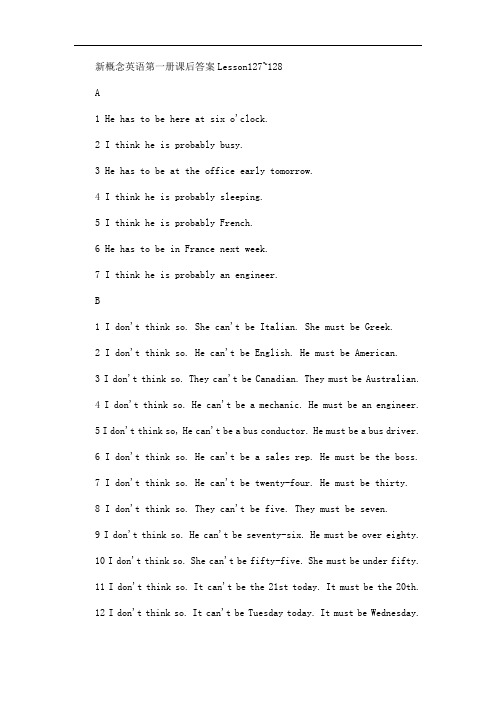
新概念英语第一册课后答案Lesson127~128A1 He has to be here at six o'clock.2 I think he is probably busy.3 He has to be at the office early tomorrow.4 I think he is probably sleeping.5 I think he is probably French.6 He has to be in France next week.7 I think he is probably an engineer.B1 I don't think so. She can't be Italian. She must be Greek.2 I don't think so. He can't be English. He must be American.3 I don't think so. They can't be Canadian. They must be Australian.4 I don't think so. He can't be a mechanic. He must be an engineer.5 I don't think so, He can't be a bus conductor. He must be a bus driver.6 I don't think so. He can't be a sales rep. He must be the boss.7 I don't think so. He can't be twenty-four. He must be thirty.8 I don't think so. They can't be five. They must be seven.9 I don't think so. He can't be seventy-six. He must be over eighty.10 I don't think so. She can't be fifty-five. She must be under fifty.11 I don't think so. It can't be the 21st today. It must be the 20th.12 I don't think so. It can't be Tuesday today. It must be Wednesday.13 I don't think so. It can't be the 2nd today. It must be the 3rd.14 I don't think so. It can't be cheap. It must be expensive.15 I don't think so. It can't be easy. It must be difficult.16 I don't think so. She can't be old. She must be young.17 I don't think so. They can't be early. They must be late.18 don't think so. He can't be reading. He must be sleeping.19 I d on't think so. They can't be listening to the radio. They must be watching television.20 I don't think so. She can't be retiring. She must be looking fora new job.新概念英语第一册课后答案Lesson129~130A1 He must have been ill.2 He had to stay at home.3 She must have been German.4 I lost my pen so I had to buy a new one.5 He forgot his case so he had to return home.6 She must have been sleeping.B1 I don't think they were. They can't have been Canadian. They must have been Australian.2 I don't think she was, She can't have been Finnish. She must have been Russian.3 I don't think they were. They can't have been Japanese. They must have been Chinese.4 I don't think they were. They can't have been butchers. They must have been bakers.5 I don't think she was. She can't have been a dentist. She must have been a doctor.6 I don't think he was. He can't have been a sales rep. He must have been the boss.7 I don't think she was. She can't have been seventeen. She must have been twenty-one.8 I don't think they were. They can't have been five. They must have been seven.9 I don't think he was. He can't have been seventy-six. He must have been over eighty.10 I don't think she was. She can't have been fifty-five. She must have been under fifty.11 I don't think it was. It can't have been the 17th yesterday. It must have been the l6th yesterday.12 I don't think it was. It can't have been Tuesday yesterday. It must have been Wednesday yesterday.13 I don't think it was. It can't have been the 19th yesterday. It must have been the 20th yesterday.14 I don't think it was. It can't have been cheap. It must have been expensive.15 I don't think it was. It can't have been easy. It must have been difficult.16 I don't think she was. She c an't have been old. She must have been young.17 I don't think he was. He can't have been ill. He must have been tired.18 I don't think they were. They Can't have been listening to the radio. They must have been Watching television.19 I don't think she was. She can't have been retiring. She must have been looking for a new job.20 I don't think they were. They can't have been sitting. They must have been standing.新概念英语第一册课后答案Lesson131~132A1 Yes, Martin is talking to Gary.2 They may go abroad.3 Gary's wife wants to go to Egypt.4 They will travel by sea.5 Yes, it may be cheaper.6 Yes, it takes a long time.7 Because his wife worries too much.B1 I'm not sure. They may be Australian.2 I'm not sure. She may be Russian.3 I'm not sure. They may be Chinese.4 I'm not sure. They may have been bakers.5 I'm not sure. She may have been a doctor.6 I'm not sure. He may be the boss.7 I'm not sure. She may be twenty-one.8 I'm not sure. They may have been seven.9 I'm not sure. He may have been over eighty.10 I'm not sure. She may have been under fifty.11 I'm not sure. It may be the 16th today.12 I'm not sure. It may have been Wednesday yesterday.13 I'm not sure. It may be the 20th today.14 I'm not sure. It may be expensive.15 I'm not sure. It may have been difficult.16 I'm not sure. She may have been young.17 I'm not sure. He may have been tired.18 I'm not sure. They may be watching television.19 I'm not sure. She may have been looking for a new job.20 I'm not sure. They may be standing.。
新概念英语第一册Lesson127~132语法及单词解析
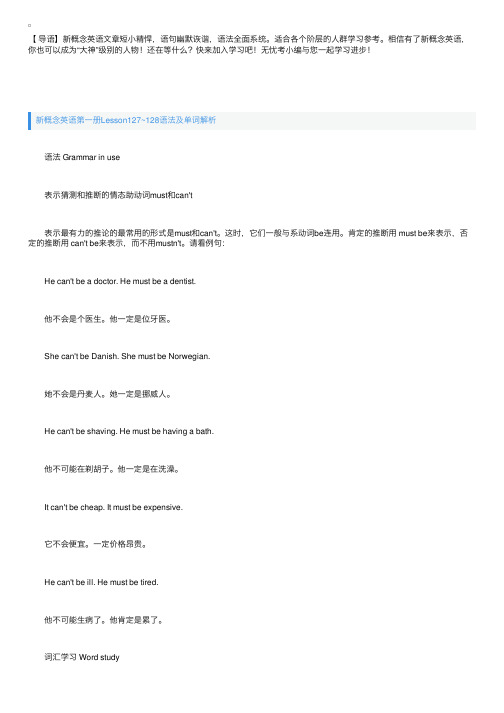
【导语】新概念英语⽂章短⼩精悍,语句幽默诙谐,语法全⾯系统。
适合各个阶层的⼈群学习参考。
相信有了新概念英语,你也可以成为“⼤神”级别的⼈物!还在等什么?快来加⼊学习吧!⽆忧考⼩编与您⼀起学习进步!新概念英语第⼀册Lesson127~128语法及单词解析 语法 Grammar in use 表⽰猜测和推断的情态助动词must和can't 表⽰最有⼒的推论的最常⽤的形式是must和can't。
这时,它们⼀般与系动词be连⽤。
肯定的推断⽤ must be来表⽰,否定的推断⽤ can't be来表⽰,⽽不⽤mustn't。
请看例句: He can't be a doctor. He must be a dentist. 他不会是个医⽣。
他⼀定是位⽛医。
She can't be Danish. She must be Norwegian. 她不会是丹麦⼈。
她⼀定是挪威⼈。
He can't be shaving. He must be having a bath. 他不可能在剃胡⼦。
他⼀定是在洗澡。
It can't be cheap. It must be expensive. 它不会便宜。
⼀定价格昂贵。
He can't be ill. He must be tired. 他不可能⽣病了。
他肯定是累了。
词汇学习 Word study 1.famous adj. (1)的;出名的: She's a very famous actress. 她是⼀位⾮常的⼥演员。
(2)<⼝>第⼀流的;极好的: To my surprise, he had a famous appetite. 让我感到惊讶的是,他有着极好的胃⼝。
This is famous weather for a stroll. 这是散步最理想的天⽓。
新概念英语第一册第131-132课重点语法

⼀、重要语法 1、情态动词 本课是有关情态动词may的⽤法的,它可以⽤来表⽰对过去、现在和将来时间发⽣的动作或状态的猜测。
如: We may go abroad. (将来) It may be cheaper. (现在) He may have been busy. (过去) ⼆、课⽂主要语⾔点 Where are you going to spend your holidays this year, Gary?1)可复习⼀下be going to do和will do的区别。
2)注意spend 的⽤法:spend sth. on sth. / (in) doing sth. We may go abroad. I'm not sure.1)注意may表⽰猜测时,可能性较⼩,所以Gary接着补充了I'm not sure。
2)go abroad,去国外。
注意提醒学⽣abroad的拼写,很容易被误拼为:abraod。
My wife wants to go to Egypt. I'd like to go there, too. We can't make up our minds.1)注意Egypt的拼写和发⾳。
2)make up one's mind,下定决⼼。
Will you travel by sea or by air? We may travel by sea.1)注意选择疑问句的回答不能⽤Yes/No。
2)可复习⼀下交通⼯具的介词⽤法,除了on foot,其他的⼀般都⽤by。
注意by sea相当于by ship,by air相当于by plane。
介词和交通⼯具间不能插⼊任何成分。
It's cheaper, isn't it? It may be cheaper, but it takes a long time.1)句中使⽤cheaper,其实是在⽐较by sea和by air的价格。
新概念英语第一册语法及专项练习
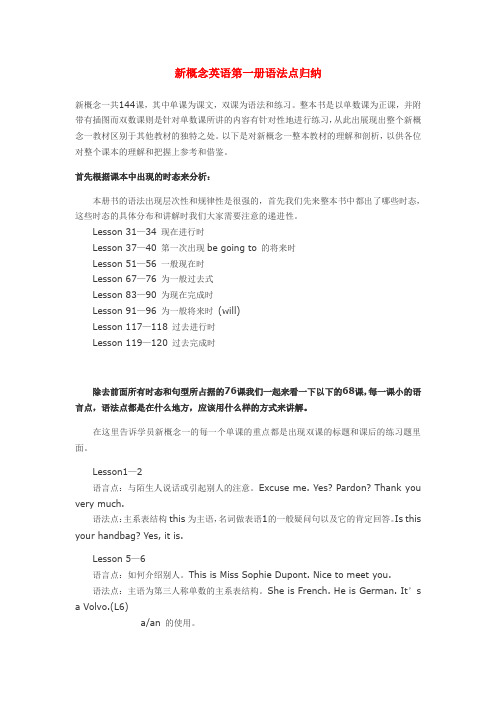
新概念英语第一册语法点归纳新概念一共144课,其中单课为课文,双课为语法和练习。
整本书是以单数课为正课,并附带有插图而双数课则是针对单数课所讲的内容有针对性地进行练习,从此出展现出整个新概念一教材区别于其他教材的独特之处。
以下是对新概念一整本教材的理解和剖析,以供各位对整个课本的理解和把握上参考和借鉴。
首先根据课本中出现的时态来分析:本册书的语法出现层次性和规律性是很强的,首先我们先来整本书中都出了哪些时态,这些时态的具体分布和讲解时我们大家需要注意的递进性。
Lesson 31—34 现在进行时Lesson 37—40 第一次出现be going to 的将来时Lesson 51—56 一般现在时Lesson 67—76 为一般过去式Lesson 83—90 为现在完成时Lesson 91—96 为一般将来时(will)Lesson 117—118 过去进行时Lesson 119—120 过去完成时除去前面所有时态和句型所占据的76课我们一起来看一下以下的68课,每一课小的语言点,语法点都是在什么地方,应该用什么样的方式来讲解。
在这里告诉学员新概念一的每一个单课的重点都是出现双课的标题和课后的练习题里面。
Lesson1—2语言点:与陌生人说话或引起别人的注意。
Excuse me. Yes? Pardon? Thank you very much.语法点:主系表结构this为主语,名词做表语1的一般疑问句以及它的肯定回答。
Is this your handbag? Yes, it is.Lesson 5—6语言点:如何介绍别人。
This is Miss Sophie Dupont. Nice to meet you.语法点:主语为第三人称单数的主系表结构。
She is French. He is German. It’s a Volvo.(L6)a/an 的使用。
Lesson 7—8语言点:如何自我介绍和相互认识。
新概念英语第一册语法知识点之情态动词的使用

新概念英语第一册语法知识点之情态动词的使用学习英语语法是许多人的痛点,今日我给大家带来了新概念英语第一册语法学问点之情态动词的使用,盼望能够关心到大家,下面我就和大家共享,来观赏一下吧。
新概念英语第一册语法学问点之情态动词的使用can, must, may, might, need情态动词can(能够),must(必需),may(可以)结构:主语+can/must/may+动词原型He can make the tea.Sally can air the room.We can speak English.★变疑问句将情态动词移到句首Can he make the tea?Can Sally air the room?Can we speak English?★变否定句在情态动词后面加notHe cannot make the tea.Sally cannot air the room.We cannot speak English.★确定回答及否定回答Yes, he can. No, he cannot.Yes, she can. No, she cannot.Yes, we can. No, we cannot.★特别疑问句:What can you do?(必背)留意:情态动词的句子没有第三人称单数的变化,不要在情态动词或动词后面加S。
1)Must/have to的区分must 表示必需,是主观上觉得应当做,have to是不得不,是由于客观条件逼迫的必要要做must 只能用在表示现在和将来的句子里,而have to do可以用在任何时态2)must, may, might表示猜想:must do 表示对现在事实的猜想must have done表示对过去事实的猜想must have been doing 表示对过去正在进行的事实的猜想may/might do, may/might have done表示没有任何事实依据的猜想,might的可能性更小。
- 1、下载文档前请自行甄别文档内容的完整性,平台不提供额外的编辑、内容补充、找答案等附加服务。
- 2、"仅部分预览"的文档,不可在线预览部分如存在完整性等问题,可反馈申请退款(可完整预览的文档不适用该条件!)。
- 3、如文档侵犯您的权益,请联系客服反馈,我们会尽快为您处理(人工客服工作时间:9:00-18:30)。
Lesson125-132 must及其它情态动词的用法一、单词1.Susan does not want to have dance class on Sunday, but she ______.(have to ) 2. --_____she leave early?--No, she ______.(must )3. I am afraid I won’t catch the bus. I _____take a taxi. (have to )4. Today is Sunday. We ______get up so early. (need to )5. I _____ tired, because I fell asleep while I was having a class.(must be )6. Lucy didn’t feel well. She______ a bad cold. (must have )7.It ______ Mr.Wu. It is said that he has gone to America.(can be )8. Look,Tom is ______ to you .(wave)9. You _______do it quickly---the teacher is leaving.(had better)二、单项选择( )1. I don’t think he _____a new bike .A need to buyB needs to buyC needD need buy( )2.We _____ talk loudly when we se e the “Be Quiet” sign.A mustB mustn’tC needD needn’t( )3. ---I can tell you the secret if you want to know.---You_____. I’m not asking you.A mustn’tB may notC can’tD needn’t( )4. Yesterday it rained heavily. We _____stay in our classroom.A shouldB mustC had toD shouldn’t( )5. ---____I put the books here?---Sorry, you can’t. You have to take them home.A NeedB MustC MayD Should( )6.You have already tried your best, so you _____worry about it .A can’tB needn’tC mustn’tD couldn’t( )7.There are______40 students in his class.A much thanB more thanC much moreD no than( )8.Don’t go there alone(独自) . You ____get lost(迷路).A needB mustC mayD should( )9. There is no light on—they _____be at home.A can’tB mustn’tC needn’tD shouldn’t( )10.Tom has ten big houses in London, so he ____ be very rich.a. mayb. mustc. cand. might( )11. — Tom is never late for work. why is he late today?— Something ____ to him.a. must happenb. should have happenedc . could have happened d. must have happened( )12. — I heard they went skiing in the mountains last winter.— it ___ true because there was little snow there.a. may not beb. won’t bec. can’t bed. mustn’t be( )13.Johnny,you __ play with the knife.You __hurt youself.A.won't,can'tB.mustn't,mayC.shouldn't,mustD.cant't,shouldn't ( )14.I didn't hear the phone.I _________.A.must beB.must have sleptC.should beD.should have been sleeping. ( )15.---- May I stop my car here? ----No, you____.A. can'tB. mustn'tC. needn'tD. don't have to( )16. ----Must we clean the house now? ----No, you _______.A. needn'tB. may notC. mustn'tD. can't( )17. You ______ return the book now. You can keep it next week if you like.A. can'tB. mustn'tC. needn'tD. may not( )18. ---Must I finish this novel this morning ? ---No, you _____.A. mustn'tB. might notC. don't have toD. can't( )19. This pen looks like mine, yet it isn't. Whose _____ it be?A. mustB. canC. mayD. might( )20. ----Must we come tomorrow? ----________.A. No, you can'tB. No, you needn'tC. No, you mustn'tD. No, you may not( )21. We _______the work so early without your help.A. couldn't finishB. can't finishC.couldn't have finishedD.can't have finished ( )22. It's still early, you______.A. mustn't hurryB. wouldn't hurryC. may not hurryD. don't have to hurry ( )23. ---I think Helen is at home.---No, she __ _be at home.She phoned me from the airport just five minutes ago.A. mustn'tB. needn'tC. can'tD. dared not( )24. --- he be watching TV now?---Yes, he_ be watching TV now."/"No, he _______be watching TV now."A. Must, can, mustn'tB. Can ,must, can'tC. Can, can, mustn'tD. May, must, needn't阅读理解一Playing FootballLook! The team from Class 1 and the team from Class 3 are playing football. A boy from Class 1 is running with the ball. He is Li Lei. Jim is running near him. He wants to get the ball, but he can't. The ball is on Li Lei's foot. Tom is running over. He is stopping Li Lei. Li Lei can't pass Tom with the ball. He passes the ball to Li Ming. Li Ming gets the ball. Li Ming is running with the ball. Oh! He kicks (踢)the ball. Woo! The ball is in.()1. Li Ming is_____.A. from Class 1B. from Class 3C. Li Lei's brotherD. a football ()2._____ are in the same team.A. Jim and Li LeiB. Li Lei and TomC. Tom and Li MingD. Jim and Tom ()3. The team from Class 1 and the team from Class 3 are _____.A. 1:0B. 1:1C. 0:1.D. 0:0 ()4. Which of the following is right?A. There is a ball on Li Lei's foot.B. Tom kicks the ball in.C. Jim stops Li Lei.D. Li Ming gets the ball in.阅读理解二Swimming is very popular. People like swimming in summer because water makes people feel cool. If you like swimming and swim in a wrong place, it may not be safe(安全的). These years, a lot of people died(死亡)when they were enjoying themselves in the water, and most of them were students. But some people are not careful in swimming. They often think they swim so well that nothing will happen (发生)to them in water. Summer is here again. If you go swimming in summer, don't forget that better swimmers have died in water. They died because they were not careful not because they could not swim. So don't get into water when you are alone. If there is a "No Swimming" sign, don't get into water. If you remember these, swimming will be safer.()41. ______ like swimming in summer.A. Few peopleB. A lot of peopleC. Only studentsD. Everybody()42. People like to swim in summer because ______.A. they feel cool in waterB. they are freeC. it makes them strongD. it is safe()43. These years ______ people died in the water when they swam happily.A. fewB. manyC. noD. some()44. Some swimmers die in water because ______.A. they think they can swim wellB. they are not strong enoughC. they are not carefulD. they like swimming very much.()45. The writer wants to tell us ______.A. swimming is a good sportB. that we should go swimming in summerC. that we must be careful in swimmingD. swimming is not safe。
